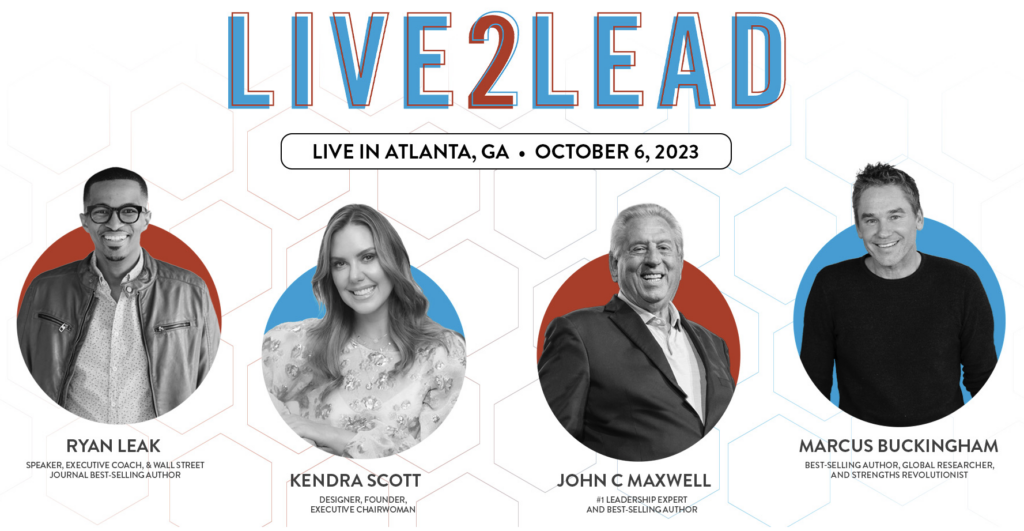Executive Podcast #256: The Miracle Skill of Curiosity

When a leader develops the skill of curiosity, they send a message to those on their team. That message is, “While I have a point of view, I realize it is not the only point of view, and I would like to hear yours – I’m teachable!”
When leaders exhibit curiosity, they encourage the diverse group of people on their team to have a point of view and to share it. It’s safe to say what you think. I value what you think.
Do you have your tickets to Live2Lead? Use the code CLPODCAST at checkout to receive 10% off any tier ticket, plus an additional 10% off with General Admission ticket orders of 10 or more!
Download our Learning Guide for this podcast!
Perry Holley:
Welcome to the Maxwell Leadership Executive Podcast, where our goal is to help you increase your reputation as a leader, increase your ability to influence others, and increase your ability to fully engage your team to deliver remarkable results. Hi, I’m Perry Holly. A Maxwell leadership facilitator and Coach Much.
Chris Goede:
And I’m Chris Goede, executive vice president with Maxwell Leadership. Welcome and thank you for joining. If you’re interested in Perry and I addressing a comment on a podcast, futuristically, I’d love for you to go visit Maxwellleadership.com/Podcast. There’s a form there, you can fill that out. Perry and I actually bring a lot of this to you from what we’re experiencing and what we’re helping leaders with over 90% and what we’re dealing with personally. So we’d love to help you with any of that. If you’re interested in some executive coaching, anything that we can serve you with. If you’ll visit that website and fill out that form, we’ll get back in touch with you. Well, today’s topic, I love this word, today’s topic. We’re going to talk about the miracle skill of curiosity. Now, I’m intrigued about the miracle skill. We’ll get to that in just a minute. But I do love the word curiosity. As a leader, I think it’s an important skill that we should really possess and develop on a continual basis. Now, why do you call it the miracle skill?
Perry Holley:
I just have looked at everything that we’re trying to teach, and especially five levels about developing influence with people. I’m a senior leader, I’ve got all this positional power and I’ve got the title, but I really want to develop relationships and influence with people. And I’m just finding that without curiosity, it just comes back. It’s the miracle skill that says, if I can just be curious, it drives humility, it drives teachableness, it drives approachableness to me in so many ways that if I’m not curious, I tend not to listen so much. I tend to talk more, I tend to not ask many questions. I tend to think I have all the answers. I tend to think you just do what I say. And just without curiosity, I feel like it drives me back to being the boss. Level one with curiosity, it helps me engage the team, engage the minds of the team. It helps take us to innovation. Creativity and change are invoked through curiosity. Have I made my case? Are you on board? Are you with me? Can I get an amen?
Chris Goede:
I almost feel like this ought to be inspiring leaders. I feel like I’m inspired after that. You know, it’s interesting, I think even those that are listening or watching, you can just feel Perry’s intensity about this. But what it is, is I was just thinking about this. You have spent so much time lately on a course we just created for teams and for organizations, and it is turning a lot of heads and helping a lot of it’s really, it’s the Generational Diversity, and it’s based off of Tim Elmore’s new book, New Kind of Diversity. I would encourage you I gave you the MaxwellLeadership.com/Podcast early in the episode. If you’re interested in learning more about that generational diversity development and that course for your team, I’d encourage you to go fill out that form. Make a note that you want to know a little bit more about that, and we’ll get in touch with you in regards to that. But you’ve been in this and immersed in it. Matter of fact, just yesterday, you spent an entire day with 30 plus people talking about this topic and the power of it. And so I think being curious, especially when there’s so many different generations in the workforce, is really the only way that we can learn, grow, and influence. And so I’ve heard you talk about the shifts that curiosity enables leaders. So let me talk about a couple of these shifts, and I’m going to throw it back to you and let you respond off of that. Right? So these shifts make us more teachable and more approachable. And so we are able to shift from when we’re curious, shift from telling to asking. We’re able to shift from judging to accepting. We can shift from blaming to non blaming. We can shift from excluding to including. And then finally we’re able to shift when we’re curious from one perspective to diverse perspectives.
Perry Holley:
Yeah, one thing that got me on this topic was someone we were talking about curiosity, and I wasn’t totally bought into it. And it’s a skill. It’s better to have it than not have it. But I just said, so all you were talking about is asking more questions, right? So you’re just saying I should ask more questions. I said, Isn’t that what curiosity means? And they said, no, it’s not. This was what blew my head up. He said, when you’re asking questions, you’re trying to get the other person to tell you they know something to prove they know something. But if you’re curious, you’re trying to learn something. And I just thought about that for a bit. I go, wow. And I’m in the professional question asking business. You are, and I’m asking a lot of questions, trying to get you to prove that you know something, when I could actually use the exact same question. And you can either preface it with, I’m curious, tell me how you got into this line of work. I’m not trying to get you to prove you know how you got into this line of work. I really am interested. I’m kind of curious. I want to learn about you. How did you get into this line of work? And I said, It’ll be the exact same words, but my tone and my delivery when I’m curious. He’s always said, I wonder, how did you solve this problem with our customer? I’m curious. How did you come up with that? How’d you come up with that answer, just prove it to me. No, I’m curious. I want to learn for myself. So I think when you are curious, you send a message to the team that while I have a point of view and I’m pretty sure it’s a good point of view but just mine, I’m interested in your point of view and I would like to hear from you. I’m teachable was the big word for me there and it encourages the people on my team to have a point of view because they know when I come I’m going to say, I’m curious. How would you do this if you were me? Yeah, I’m curious. Does this fit into the way you see our direction that we’re going? And it just enhances the engagement that I have with the team. I think it improves productivity because people come prepared. They know that I’m not just going to rubber stamp things. I want to be curious, are we moving in the right direction? Are we doing the right things? Could there be a better way? I’m open to your thoughts. This has so many it’s the miracle.
Chris Goede:
Yeah, I love it. I really wondered how you came up with that, but I agree and it’s funny as you were talking, I’m like, man, you do that all the time and I see you live this out. We could be anywhere. We could be in a meeting with one other individual. We could be with our team, we could be with a client in the organization and you go, hey, I do have a point of view, but I would love to know your point of view. Right. And it’s not because you want their point of view and then you’re going to change your point of view. You truly are curious and want to understand kind of where they’re coming from. So I see you live that dude at home, too.
Perry Holley:
Because I’ve been told it can be intimidating but I don’t mean to be. So that’s why I say to making people feel, oh, maybe if I just became more curious and I can’t remember if it comes up here, but Tim Elmore said you can talk like you’re right but listen like you’re wrong.
Chris Goede:
That’s so good.
Perry Holley:
Could I just be know I have a point of view but I’m curious, what’s your point of view? And then I listened to you talk as if teach me I could be wrong. And I thought, well, when Tim said that here on this podcast table, I was, whoa, that is huge.
Chris Goede:
Yeah, there’s yeah, there’s a huge difference between asking questions and being curious. I love that. So let’s jump in and talk about, well, how do we improve the skill of curiosity? The first one that we want you to understand is that curious leaders must develop their self awareness and fully self aware leaders are aware of their strengths and their weaknesses. Didn’t happen by chance or it wasn’t easy, but the become aware of that. They’ve group and learned that. And while they may know many things, they don’t know everything. And so we need to make sure that from a posture of man, we want to grow, we want to learn. And I think John says it something of this which, you know, when I’m done learning, I’m done right? Like, I’m going to learn till the day that I’m done. And I think that’s just a posture we have to have. And so part of that is learning about yourself. And so you must continue if you’re going to be curious to develop your self awareness leaders.
Perry Holley:
I think this to me is this alone just drives teachability that you are self aware enough to know that your own strengths and your own weaknesses. You also know your effect on other people, and you know what you bring and what you don’t bring to the conversation. So I love this ability by being curious to say, go back to talk like I’m right. I think I’m right, but I could be wrong. It’s that self awareness that I have some strengths, but I also have some weaknesses. I also have some blind spots, and I’m aware of that. Even though I may not be aware of every blind spot, I know I have them. So if I could just be curious and listen more and understand your point of view, I might learn something about myself. But you have to be self aware to do that. Another thing is that curious leaders are really never satisfied with the status quo. They embrace that curiosity of asking, I wonder how we can improve this? I’m curious, how do you see this? Could we do this better? You’re really good at that. I know you have a strong point of view on how we do things, but you never stop there. And we have this smart team that we work on, and you’re asking the people that handle the administrative side. You’re asking the people that are in front of the customers, you’re asking, how can we do this better? I’m curious, what’s your point of view?
Chris Goede:
Yeah, we talk about change as leaders and as we lead teams and one of the ways that you can never be satisfied with status quo is always be thinking about not for just change sake, but how do we change what we’re doing in order to continue to get better and strive to be able to do that? Another idea to increase your curiosity is to create a learning culture. Leaders with curious mindset view every experience, good, bad, whatever it might be, as a learning experience. I love this John, even down to his grandkids. They go on vacation once a year and it is a great time, family time. But he’s like, what did you learn? Let’s evaluate the experience. I know we all had a lot of fun. Let’s evaluate it now and what did we learn? I think also when you think about this, let’s go back to this question, asking questions. We do need to ask questions. They’re essential into uncovering. I think it’s the tone and the posture and the thought behind those questions that are really driving the curiosity so that we can then learn, grow, not settle for status quo, but then continue to have a better outcome. One of the questions that I wrote down here that I was thinking about in creating a learning culture is we talk a lot about, hey, we kind of diagnose when we’re working on things and we’re doing things, we go through projects. One of the questions I would challenge us to start thinking about as listeners and our viewers is as you go through these projects or things you’re working on, this company ask this question once it’s over with. What happened on this project that we did not expect, right? That’s a different question than saying, hey, what drove the outcome? Whatever. Just a small little change to a question really begins to go. Not that I’m good at making, but when you get people thinking that way, that’s being curious.
Perry Holley:
In the question, we talk about the AAR, the After Action review, but we hardly ever do it when we win, we do it when we lose. But what made it work and how could we have made it better even if we were successful? And it gets people, I think by developing this culture of curiosity, that it causes people not to fear failure as much or to fear making a mistake. We’re going to do the AAR, we’re going to learn from it, and we’re not going to make that mistake again. But it says by being curious, I say, Well, I wonder if we tried it this way, what if that failed? Well, don’t be curious, just do what you’re told. No, I really want you to do that. I think another way to increase your curiosity is to increase the diversity of your team. We talk a lot about diversity, equity, inclusion, these types of things. But leaders who really embrace the diversity of the team and build a team of diverse people that are complementary to their own, but not the same. They’re not like me. You can naturally be more curious because you’re dealing with differences. You think differently than me. You have a different come from than me. You have a different background than me. You have a different thought process than me. But if I have everybody like me, I don’t really need to be curious, because I already know how you think. But if I really have a diverse team, the one way I can make them feel included, valued, like they belong, is to be curious and say, tell me how you see this. How does your background, how would you handle this? What is your thought process on that? Now I’m teachable again, that makes me.
Chris Goede:
Go back to something you’ve shared here on our podcast before about one of your early on experiences in a boardroom where your leader is like, well, Perry, if you think just like me, one of us is not needed, I’ll let you guess who that is. The security team will escort you. You know, I was thinking about our team, and we have an individual on our team that thinks differently than I do. And you’ve been instrumental kind of in mediating both sides of it, right? You’re like, hey, you might need to pipe down a little bit there. When you give Chris and you’re like, Chris, you probably ought to listen to some of the but what’s been really good for me, and I absolutely love this individual and the way that they think and bring ideas, but it’s diverse. It’s different than most of the makeup of my team, and it’s really challenged the way and we’re better because of it 100%. And I hope she’s better because of your coaching of how to communicate to me about it. But I have found myself going, man, that’s interesting. Tell me more. Okay. What are you thinking about here? Well, how did that work? And brings a great perspective and allows me to be a little bit more curious in that on the team. Well, another one that we want to talk to you about, about increasing your curiosity is develop your active listening skills. And, man, when curiosity shows itself, it’s really, truly the way that you listen. And when we talk about active listening, to your point, you can just ask a normal question and sit there and listen. But if you’re going to be curious, you got to be engaged in that listening to dig more. And to your point just a minute ago, tell me more. And you really want to do it so that you’re understanding, so that you can respond to them.
Perry Holley:
Yeah. Some of my favorite active listening tools are phrases like, tell me more. What happened next? Then what did you do? And it reminds me to not get in such a hurry for my turn to talk, and so am I really listening? Do I know the best next question to ask to draw the learning from this person. And I tell you the truth is the big truth that really would help with your curiosity building is that if you believe in your mindset, your heart set, is that I can learn something from every person I meet. Doesn’t matter what their stature in life, what their position, what they do for a living, how much money the do. I can learn from everyone I meet. I had knee surgery a few weeks ago. I was in PT first time this week. And I had this young kid and my first thought was, what does he know? What could he possibly know? And then I had this thought, I’ve been working on this lesson and I thought, you know what? I’m going to engage. First of all, I’m making him feel something. What am I making him feel? So I smiled and I greeted him and he was actually from another country, so it made the communication was a little difficult at first, but then I thought, how can I be curious? So finding out where was his family from? And then how did he get into this line of work realizing he was not as young as he appeared. He was actually pretty good at he knew his stuff. And then I started realizing, what can I learn from him? Which I thought was, I went in, but because I want to be more curious and thinking I can learn something from every single person I meet if I have that attitude, it just naturally ratchets up your natural curiosity.
Chris Goede:
I love that. Well, listen, as we wrap up, I was sitting here listening to you and I was thinking about this. We are in the people business. And so all the examples we talked about from around curiosity were around engaging people and asking questions. There are so many resources out there for us when it comes to growth and personal growth, for you to be curious, get outside of your industry to learn more. What I mean by that is go learn and be curious about how people are doing things that may work inside your business. Be curious in everything that you’re doing, your personal life, your professional life, engagement with people. But the also as you begin to have a personal growth plan and what does that look like? Be curious of how people are doing things a little bit different instead of just going along with the status quo. The other thing, as I kind of wrap up, I think this is one of two things in regards to competencies that leaders need to really, really focus on. I know that you called it a miracle skill, and it would be a miracle, literally, no pun intended, if we all became a little bit more curious and we talk about that. We as human beings will judge people by their actions without even being curious. We don’t know what their intent was.
Perry Holley:
Right?
Chris Goede:
And so I would just challenge everybody that’s listening to think about how do we become more curious. And the other thing is that I talk about often is how do we become more consistent. So it’s the CCS. That’s what I’m going to leave you with. How do we become more consistent in how we treat people, how we lead people, how we grow? And then how do we be more curious about the people that are around us, what we want to learn from them and how we grow? And so if you take anything away, know Perry. And I bringing this lesson to you, man. Be more consistent and be more curious.
Perry Holley:
I love it. Consistency is one of my favorite words. Well, thank you, Chris. And just a reminder, if you’d like the learner guide for this episode, if you’d like to leave a comment or a question for us, you can do that all at podcast. You can also learn about our offerings and the other podcasts in our podcast family can be found there. We love hearing from you. We’re very grateful you’d spend this time with us. That’s all today from the Maxwell Leadership executive podcast.
To be a Successful Leader, You Need Feedback on Your Leadership.
We’re excited to announce our new and improved Organizational Effectiveness Survey (OES). The OES gathers feedback from employees to give leaders and management the knowledge and action plans needed to develop a more effective and productive work environment. Our new version measures 4 areas of your business: Leadership, People, Strategy, and Performance.














Be the first to comment on "Executive Podcast #256: The Miracle Skill of Curiosity"